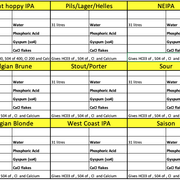Realalemonster
Active Member
Sorry if this has been asked previously (33 pages of posts is a lot to trawl through), but can I use Ph papers to give a rough guide to my alkalinity?

Nope I'm afraid not. Alkalinity isn't the same as pH, it's a measurement of buffering capacity rather than hydrogen ions.Sorry if this has been asked previously (33 pages of posts is a lot to trawl through), but can I use Ph papers to give a rough guide to my alkalinity?
Had a feeling it wasn't that easy!Nope I'm afraid not. Alkalinity isn't the same as pH, it's a measurement of buffering capacity rather than hydrogen ions.
Has anyone requested a report from Scottish Water, and if so, how?
All I can find on the website is how to make a complaint or report a service problem...












What's your postcode? What is the issue with the results not having any meaningful info.

 As for the upper limit, honestly I don't really know but the figures you suggested seem reasonable to me.
As for the upper limit, honestly I don't really know but the figures you suggested seem reasonable to me.Have a look at this thread. It's got helpful suggestions by style including NEIPA.Can anyone give me some recommendations to treat ashbeck water please for a NEIPA. I have gypsum, Campden tablets and CRS. thanks in advance. I tried the calculator but no specifics for NEIPA
You will need lots of calcium Chloride if you want to get anywhere near a soft and rounded water profile. Gypsum wont help you.Can anyone give me some recommendations to treat ashbeck water please for a NEIPA. I have gypsum, Campden tablets and CRS. thanks in advance. I tried the calculator but no specifics for NEIPA


Enter your email address to join: